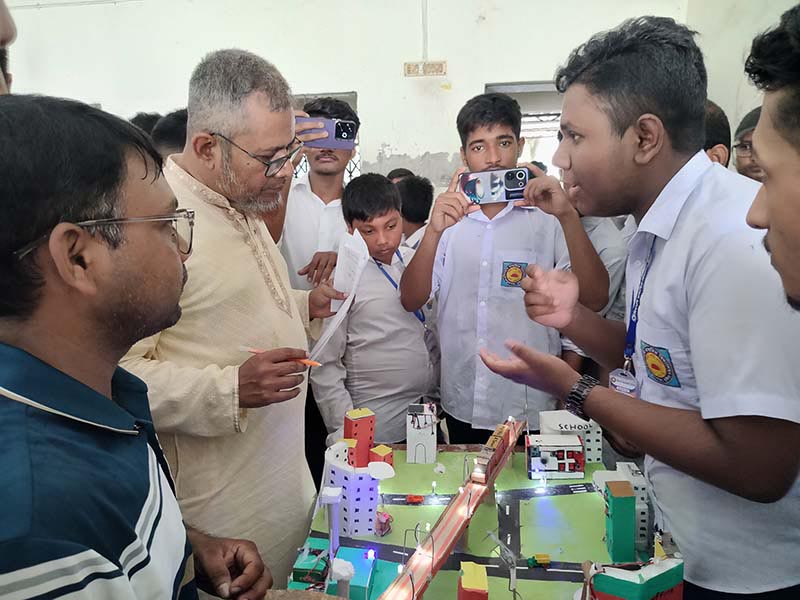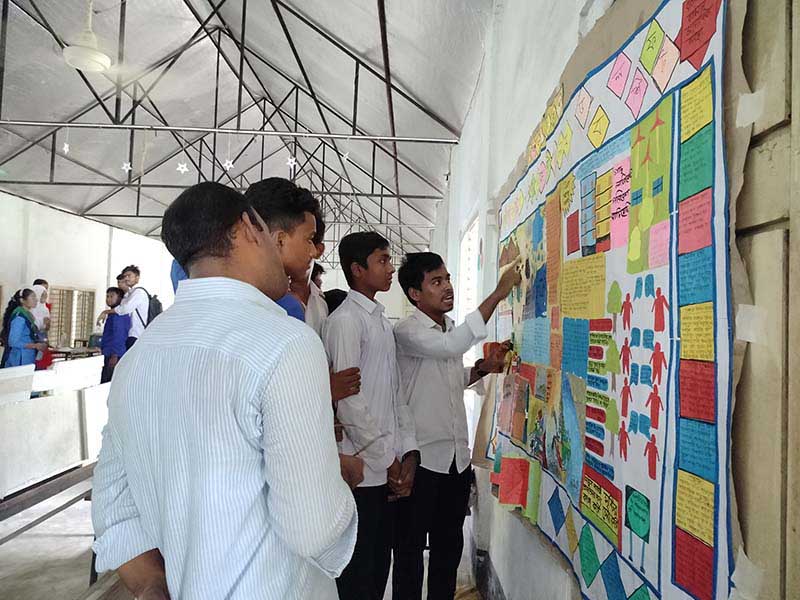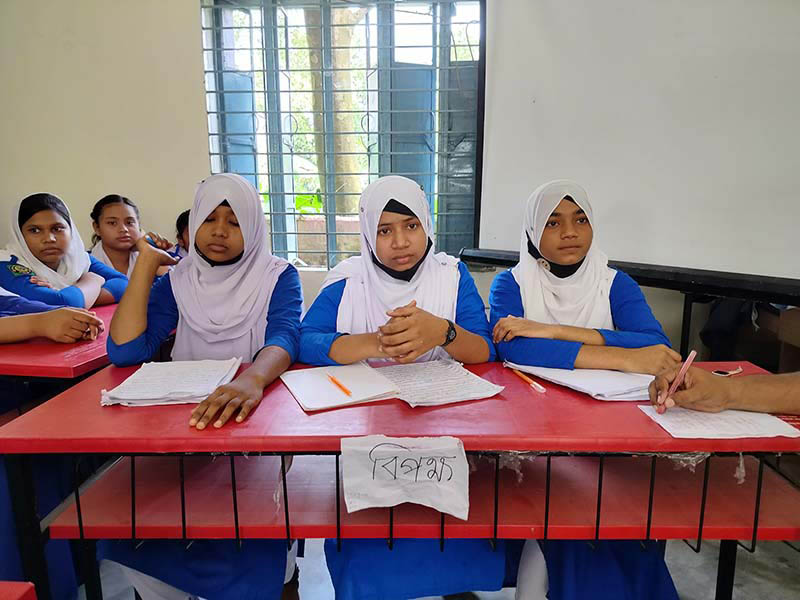Science Club Activities in Bangladesh: FAIR Initiatives

Introduction
Science Club Activities in Bangladesh play a vital role in fostering scientific curiosity, innovation, and STEM education among students. However, science education in Bangladesh faces significant challenges, including limited resources, inadequate infrastructure, and insufficient hands-on learning opportunities. To address these issues, Friends Association for Integrated Revolution (FAIR), a rights based and development organization has been actively promoting Science Club Activities in Schools to bridge the gap between theoretical knowledge and practical application.
Since 2019, FAIR, in collaboration with Bangladesh Freedom Foundation (BFF), has implemented a structured program ‘‘promoting Science Education in Secondary School” to enhance Science Club Initiatives in Kushtia. This includes the establishment of 30 Science Clubs in 30 secondary Schools, where students participate in engaging activities such as science fairs, quiz competitions, debates, and science-based wall magazines. Additionally, digital skills development programs and coding workshops are being introduced to prepare students for a technology-driven future.
Moreover, FAIR has successfully conducted Science Project Development Workshops across five schools with funding support from the Ministry of Science and Technology. These workshops aim to improve students’ skills in developing innovative Science Club Activities for High Schools, strengthening their understanding of scientific methods and experimentation.
Background: Why FAIR Initiated Science Club Activities in Bangladesh
Science education in Bangladesh has long struggled to reach its full potential—particularly in rural and semi-urban areas, where students often lack access to hands-on learning experiences. The traditional textbook-centric approach has limited opportunities for students to develop creativity, analytical thinking, and innovative problem-solving skills—essential pillars of a strong STEM foundation.
Recognizing these challenges, the Bangladesh Freedom Foundation (BFF) has been working for years to improve science education by introducing practical and engaging learning methods. Drawing on its extensive experience, BFF partnered with the Friends Association for Integrated Revolution (FAIR) in 2019 to launch a targeted initiative: Science Club Activities in Bangladesh, starting in the Kushtia region.
This initiative was designed to build a vibrant science culture within schools, where students could engage in real-life science projects, experiments, and collaborative learning. With support from BFF, FAIR aimed to bridge the gap between theory and practice by promoting Science Club Activities in Schools, fostering interest in STEM fields, and nurturing the future leaders, creative minds, and solution-driven individuals who will shape the world through their innovative thinking and problem-solving abilities.
The Role of Science Clubs in Bangladesh
Science Club Activities in Bangladesh offer students an excellent platform to enhance their knowledge beyond traditional textbooks. FAIR’s Science Club Initiatives focus on:
- Enhancing Scientific Literacy – Encouraging students to build a strong foundation in STEM through practical learning.
- Promoting Hands-on Experiments – Providing students with the opportunity to conduct real-life experiments and projects.
- Encouraging Participation in Science Competitions – Boosting students’ confidence and motivation in science.
- Developing Leadership Skills – Engaging students in club management to enhance teamwork and problem-solving skills.
- Bridging the Gap between Theory and Practice – Helping students apply classroom knowledge to real-world challenges through science fairs and exhibitions.
FAIR’s Key Initiatives to Promote Science Education
FAIR has introduced several key initiatives to strengthen Science Club Activities in Bangladesh and encourage STEM education:
1. Establishing 30 Science Clubs in Kushtia
Since 2019, FAIR has launched 30 science clubs in schools throughout Kushtia Sadar Upazila, fostering a culture of scientific learning. These clubs serve as dynamic learning hubs where students actively participate in science-related activities, engage in peer learning, and develop an investigative approach toward science.
2. Monthly Science Club Meetings
Each Science Club in Schools holds monthly or bi-monthly meetings to plan activities, discuss challenges, and implement club policies. These meetings provide an opportunity for members to evaluate past events, plan upcoming projects, and ensure active participation in Science Club Activities.
3. Organizing Science Fairs
To make science education more interactive and engaging, FAIR organizes school-based science fairs where students present their innovative projects and experiments. These fairs encourage young minds to think creatively and develop problem-solving skills.

4. Science Quiz Competitions
FAIR promotes science quiz competitions to help students enhance their knowledge of science, develop quick-thinking skills, and encourage healthy academic competition among peers. These activities are crafted to captivate the audience and challenge their intellectual curiosity.
5. Science Debates and Public Speaking Competitions
Through science-based debate competitions, students critically analyze scientific issues, form logical arguments, and improve their public speaking skills. FAIR believes that effective communication is a key aspect of scientific inquiry and education.
6. Developing Science-Based Wall Magazines
To foster creativity and a love for science, FAIR encourages students to contribute to science wall magazines where they write articles, draw illustrations, and present research findings. This initiative allows students to express their ideas and discoveries in an artistic and informative manner.
7. Annual Inter-School Science Festival
At the end of each academic year, FAIR organizes an Inter-School Science Festival, bringing together all participating schools to showcase their projects, compete in various science-related events, and exchange ideas. This festival serves as a platform for knowledge sharing and inspiration for young aspiring scientists.
8. Computer Programming and STEM Training
FAIR acknowledges the increasing significance of digital literacy in today’s rapidly evolving world. As part of its science education initiatives, FAIR has introduced computer programming training for secondary school students. This program teaches fundamental coding and computational thinking, preparing students for a future in technology-driven fields.
9. Science Promotion & Awareness Campaigns
FAIR actively engages in science advocacy and awareness campaigns, ensuring that students not only learn science but also use their knowledge for societal benefit:
- World No Tobacco Day Awareness – Encouraging students to participate in discussions on public health and the dangers of tobacco use.
- Science Awareness Activities – Encouraging students to promote scientific knowledge within their communities.
- Environmental and Health Awareness Initiatives – Science clubs participate in dengue prevention campaigns, tree plantation programs, and hygiene awareness activities.
- International Women’s Day in STEM – FAIR promotes gender inclusion by encouraging female students to engage in science education and careers.
- Public Science Education Seminars – FAIR hosts interactive discussions and expert talks on scientific advancements and sustainability.
10. Training and Capacity Building for Science Clubs
To ensure the effectiveness and sustainability of science clubs, FAIR conducts a range of training programs for students and teachers:
- Science Club Orientation Training – At the beginning of each academic year, newly formed or reformed science club committees undergo training to understand their roles, responsibilities, and long-term goals.
- Teacher Training Workshops – FAIR provides training programs for science teachers to help them implement innovative teaching techniques and conduct cost-effective science experiments.
- Science Project Development Workshops – Hands-on workshops where students learn to develop science projects, conduct research, and present findings.
- Low-Cost Science Experimentation Training – Training sessions that teach students and teachers how to conduct experiments using affordable, locally available materials.
- Science Seminars & Expert Talks –Seminars where science educators, civil society members, and professionals provide insights on sustaining and enhancing science club initiatives.
11. Support for National Science Competitions
FAIR provides mentorship and guidance to students participating in Science Olympiads, Math Olympiads, and other national STEM competitions.
12. Student Participation in Innovation & Research
FAIR encourages students to work on research-based projects, participate in innovation competitions, and develop real-world applications of scientific principles.
Impact & Achievements: Empowering Creativity and Innovation through Science Clubs
Science Club Activities in Bangladesh have had a profound impact on students by fostering creativity, innovation, and scientific expression:
- 30 student-driven science clubs have been established, significantly increasing student interest in STEM subjects and providing an engaging platform for hands-on science learning.
- Leadership skills have been developed within club members, empowering them to take charge of their projects and initiatives.
- There has been a noticeable increase in student interest in science and STEM education, leading to a rise in enrollment in science streams at schools.
- Teaching quality has greatly improved, creating more engaging classroom environments and ensuring that students enjoy learning science.
- Student participation in science fairs and competitions has seen an increase, especially among female students, encouraging them to pursue scientific exploration.
- National and regional competition participation has grown, with an increase in the number of winners, further motivating students to excel in science.
- Environmental awareness has increased among students, who are now actively participating in sustainability initiatives and community-driven science projects, such as tree plantation and green projects.
- The growing support and collaboration from school authorities has strengthened the foundation for the science clubs to operate more effectively.
- Parental awareness about science education has increased, reducing science-related fears and encouraging parents to support their children’s scientific learning.
Project Learnings
FAIR’s Science Club Initiatives have provided valuable insights into improving STEM education and student engagement in Bangladesh. Some of the key learnings include:
- Increased Student Engagement: Hands-on science activities have led to greater student interest in STEM subjects.
- Enhanced Academic Performance: Practical learning methods have significantly improved students’ understanding and retention of scientific concepts.
- Growing Interest in STEM Careers: Exposure to real-world scientific applications has motivated more students to pursue careers in STEM fields.
- Strengthened Problem-Solving and Teamwork Skills: Science club activities have fostered collaboration, creativity, and critical thinking among students.
- Greater School Recognition: Participating schools have gained credibility and appreciation for their contributions to science education and student development.
Implementation Challenges: Barriers to Science Club Activities in Bangladesh
While implementing Science Club Activities in Bangladesh, FAIR faced several practical and institutional challenges:
- Funding Shortages: Many schools lacked resources to organize hands-on science activities or buy essential lab tools without external help.
- Teacher Readiness: Some science teachers were untrained or hesitant to conduct interactive science practical class, limiting effective engagement.
- Low Priority from School Authorities: Science clubs were often seen as non-essential, leading to irregular sessions and minimal support.
- Irregular Academic Calendars: Frequent school closures and exam schedules disrupted the planned timeline for activities.
- Lack of Commitment from School Leaders: Despite student interest, some head teachers and science faculty showed limited ownership, prioritizing personal convenience over professional responsibility.
- Weak Local Collaboration: Consistent support from education authorities and partners—especially for digital skills—was often hard to secure.
Despite these challenges, FAIR adapted by rescheduling activities, training teachers, and working closely with schools to sustain and scale up Science Club Activities in Bangladesh.

The Future of Science Clubs in Bangladesh
FAIR envisions expanding Science Club Activities in Schools nationwide by:
- Establishing more science clubs across Bangladesh.
- Partnering with government and private organizations for funding.
- Introducing digital learning platforms and virtual experiments.
- Hosting national-level science competitions to inspire students.
- Strengthening teacher training programs to enhance science education.
How You Can Support Science Education in Bangladesh
You can contribute to FAIR’s mission of promoting Science Club Activities in Bangladesh:
- Sponsor a Science Club – Support establish and maintain Science Club Activities in Secondary High Schools.
- Donate Educational Resources – Support with laboratory equipment, books, and digital learning tools.
- Volunteer as a Mentor – Share your expertise by mentoring young science enthusiasts.
- Collaborate with FAIR – Partner with us to expand Science Club Initiatives and STEM learning.
Conclusion
FAIR’s initiatives have made remarkable strides in promoting Science Club Activities in Bangladesh, strengthening science education, and preparing students for future challenges in STEM fields. The continued efforts in expanding science clubs, improving teacher training, and integrating digital learning tools will further enhance the sustainability and effectiveness of these programs. FAIR remains committed to nurturing young minds through science education, fostering a generation of future scientists, innovators, and problem solvers who will contribute to national and global progress.
Through its science club initiatives, FAIR has observed several key takeaways:
- Student engagement in STEM subjects has significantly increased.
- Hands-on learning has led to improved academic performance.
- Encouragement of STEM careers among students has expanded.
- Problem-solving and teamwork skills have been strengthened.
- Schools are receiving recognition for promoting Science Club Initiatives.
🔗 Learn more about FAIR’s Science Club initiatives here: FAIR Science Club Program
